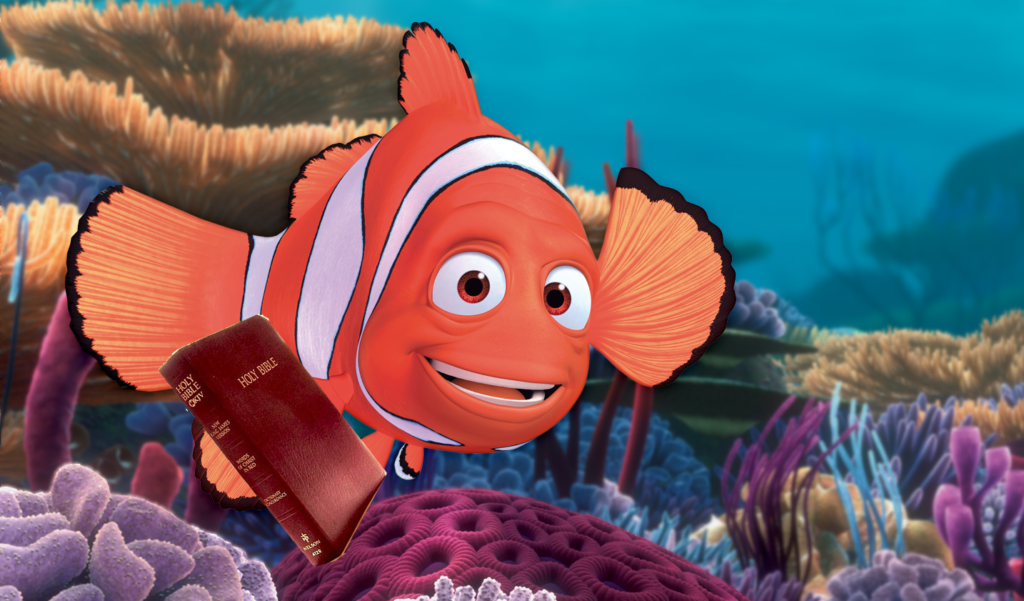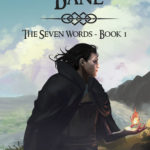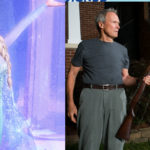Six Famous Characters Christians Can Appropriate
Once again, Christians have shown themselves out of touch with the real world.
Recently in the real world, people from a competing religion started internet movements such as #GiveElsaAGirlfriend and #GiveCaptainAmericaABoyfriend. They argue that famous characters, such as Elsa from Frozen and Captain America from the Marvel films, ought to receive in-story same-sex relationships, because they ought to receive them.
We are letting other religious people outshine us in this vital area of popular culture appropriation. Once more, we see the American church has failed us. We must do better.
So I propose six famous characters Christians can appropriate for moral causes.
Let’s begin with:
#HelpMarlinFindJesus
In 2003, Pixar Animation  Studios introduced audiences to Marlin, a clownfish father who is overprotective of his son, Nemo. But when Nemo is kidnapped, Marlin must struggle to put aside his fears and find his son. Tomorrow’s sequel Finding Dory promises similar themes.
Studios introduced audiences to Marlin, a clownfish father who is overprotective of his son, Nemo. But when Nemo is kidnapped, Marlin must struggle to put aside his fears and find his son. Tomorrow’s sequel Finding Dory promises similar themes.
But what about a third film? Wouldn’t it be better if, rather than finding Nemo or finding Dory, Marlin the fish put aside his fears of sharks, jellyfish, and whales, and found the Lord?
It just makes sense for the story. The director, Andrew Stanton, is a professing Christian, and thus he should tell stories that specifically represent his “people.” Scripture is full of stories about seeking to save people who are lost. And besides, Marlin the clownfish is a fish, and this is an ancient symbol for Christianity.
#KatnissShouldFightFortheKingdom
Katniss Everdeen in The Hunger Games novels and films is a conflicted heroine. She is forced to lead a revolution she doesn’t much care about at first, all while trying to protect her family. These are two very challenging themes of good and evil, and focus on a family, and both these themes are very Christian. So Katniss may as well go the full way and put her faith in a true Kingdom that will last long after Panem has crumbled into memory.
Of course, this will necessitate a few changes that should be part of novel revisions and a remake of the film adaptations. As much as we admire Katniss, she is often too independent and does not trust enough in her community. This is true of her mother, whom Katniss should seek to “honor … that [her] days may be long in the land that the LORD your God is giving you.” This is also true about the men in her life, Gale and Peeta. They should fulfill their biblical roles as Katniss’s leaders, while Katniss works to submit to their headship.
In the movies, Katniss is also seen wearing tight-fitting clothing. This could cause men to stumble. If Katniss is to fight for the true kingdom, she must consider garments that are more appropriate to her task, such as loose-fitting blouses and skirts.
#OverwatchShouldFeatureTheBodyofChrist
 I’ve heard of a new video game called “Overwatch.” I’ve read a few reviews of this game. Some focus on the differing roles of game characters, each of whom has different gifts and abilities to use in battle against enemy hordes. Immediately I thought of the apostle Paul’s description of the different members of the body of Christ in 1 Corinthians 12.
I’ve heard of a new video game called “Overwatch.” I’ve read a few reviews of this game. Some focus on the differing roles of game characters, each of whom has different gifts and abilities to use in battle against enemy hordes. Immediately I thought of the apostle Paul’s description of the different members of the body of Christ in 1 Corinthians 12.
So I think this new game, “Overwatch,” should make these themes even clearer.
If some characters act as the “eye” of the body, and others act as “the hand,” then they ought to have little icons of these body parts on their uniforms or hovering over their heads. Perhaps they could also show little verse references stamped on their sleeves.
Speaking of clothing, however, that one character (or perhaps two), in the tight pants, should be re-clad because even nonbelievers have been saying these characters could make men stumble. But other characters who wear armor could be shown more clearly to be wearing the “full armor of God,” such as the helmet of salvation or the shield of faith.
#ReyShouldWieldTheSwordoftheSpirit
 Another famous character could wield the “sword of the Spirit” found in Ephesians 6:17. I’m speaking of Rey from Star Wars: The Force Awakens and the upcoming new Star Wars films. In the first story, Rey gains a lightsaber, a very famous weapon that reminds us of the apostle Paul’s description of a sword that is “the word of God.”
Another famous character could wield the “sword of the Spirit” found in Ephesians 6:17. I’m speaking of Rey from Star Wars: The Force Awakens and the upcoming new Star Wars films. In the first story, Rey gains a lightsaber, a very famous weapon that reminds us of the apostle Paul’s description of a sword that is “the word of God.”
But Rey should recall that this “sword” is not real. It serves as a metaphor for spiritual realities such as Scripture reading and prayer, which are a believer’s true weapons. Only then can she withstand the flaming sword of her enemy, Kylo Ren.
Some fans have criticized Rey’s expert use of The Force1 after only a few days. After all, Luke Skywalker trained for a few more days on Dagobah in The Empire Strikes Back.
But if Star Wars embraces its Christian heritage, this can easily explain the story problem. Rey’s use of The Force is raw and untested. As a new Jedi knight, she must seek training, and this training ought to come from the men in her life, the spiritual authorities God has placed over her. In Force Awakens, Rey meets Finn as well as Han Solo, who becomes a father figure to her. By the story’s end she meets Luke Skywalker himself, and the story promises he will train her in the ways of The Force. This can encourage godly womanhood.
#LetDuanePutHisFaithInTheRock
 Duane Johnson calls himself The Rock.
Duane Johnson calls himself The Rock.
But wouldn’t it be better if, in every one of his movies, he promoted the Rock of Ages?
I say this because Johnson seems a swell person. In all of his movies I’ve seen, such as Race to Witch Mountain and San Andreas, he displays charisma, a contagious grin, and godly masculinity in the form of helping others as well as muscles. These things have no value in movies apart from a specific proclamation of a particular agenda. So why not Christianity’s?
#ThoseGuysFromSupernaturalShouldFightForTheGospel
 I don’t regularly watch “Supernatural.” In fact, I haven’t seen a single episode. But I’ve seen enough commercials for it while watching other shows. And I know there are two brothers, and one of them is named Dean Winchester, and one or the other says, “We’re on a roll.”
I don’t regularly watch “Supernatural.” In fact, I haven’t seen a single episode. But I’ve seen enough commercials for it while watching other shows. And I know there are two brothers, and one of them is named Dean Winchester, and one or the other says, “We’re on a roll.”
Perhaps there is much to enjoy about this show, such as stories involving large men who hunt vampires, werewolves, killer clowns, and zombies. But I don’t know what these things are or what benefit they offer me. So the best approach is to use it as a tool for my agenda.
So therefore I suggest that Dean Winchester (if that is his name) and his brother should instead be shown fighting for the Gospel. And I suggest their enemies be shown as demons (according to a biblical and not secular worldview), prosperity “preachers,” and atheists. This is simply the best thing to do with this show, regardless of what its actual fans think.
These are just a few suggestions for famous characters Christians should hijack. I strongly encourage you to repeat the simple hashtags suggested above, and join this moral cause.
How about you? What other famous characters do you suggest for Christian hijacking?
- “The Force” in Star Wars has some non-Christian ideas mixed with biblical miracles. ↩











































This is so Poe’s Law that it almost hurts.
Great way to parody the way people demand that media change to fit their causes :). I see some people demanding that superheroes normally portrayed as straight should suddenly be turned gay in the actual canon of their stories. To me it would make more sense if they would ask that a new gay superhero was invented, rather than forcing people to completely alter an existing hero.
An article I read one time was talking about some Walking Dead character and how the fans wanted that character to come out as gay. One person said something along the lines of ‘this character is a nice person, so I think he should be gay because gay people are kind.’. So they seemed to think that the show needed to educate people on how nice most gay people apparently are. Or that there are far more kind gay people than there are straight people, so much so that it would be better or more realistic to portray this beloved, kind character as gay. If one wanted to be sensitive about this issue, they could see that whole idea as an insult to straight people.
If the makers of Walking Dead want to make their character a certain way, that is their choice. Personally, I kinda dislike it when fans demand that an author write certain types of characters and stories, as if it is the author’s job to represent minorities, or as if the fans partially own a story and have a right to decide what happens in it. Having character diversity is great, but as a girl of mixed ancestry I don’t automatically see authors as racist or sexist just because they don’t feature characters like me. If I don’t like a book, I might rant about it to a friend or talk about why I find the views in it problematic, but I don’t call the author horrible for not changing their writing to fit my views. They can write what they want, and if I don’t like it I read something else. People may call me a bigot for thinking that, but I don’t think that is an unfair way to think, considering that even though religious people are often persecuted or looked down on and are under represented in media I don’t freak out at authors for not cranking out tons of accurately portrayed religious characters. But if people truly want diversity in stories, they will allow even the voices they dislike to remain in media, and if any specific representation is needed, the complainers can represent a minority within their own published works, rather than demanding that authors change the way they write.
@Leah: Yeah, I agree that a lot of people might miss the point of this article.
I wish more fandoms had your attitude, Autumn
http://the-toast.net/2016/06/22/challenges-of-representation-writing/
Neat article, thanks for sharing! 🙂
It’s really interesting to me, because growing up I’ve had a vastly different experience with the characters I liked and identified with. I’m half white and half Latino. But I never really felt marginalized, and I didn’t identify with characters based on race. I usually just liked the characters that happened to seem cool to me. Either that or the ones I made an emotional connection to because I identified with them. Many times that was the main guy character. And I think that was because growing up I wanted to be taken seriously on some level and to be able to handle whatever life threw at me. Many guy characters in stories exhibited that, along with having interesting backstories(and I love characters with cool backstories).
To be honest, there were many times when I didn’t even recognize a characters race, or at least not for a long time. When I did notice, it was slightly interesting for me, but that was all. It didn’t matter to me, because all I wanted was to watch cool characters in a cool show. So I guess I can’t help but feel that the representation issue isn’t just a matter of people not showing more racial or gender diversity in media. I think it’s also a matter of how we condition people to react. If we want to be truly free of racism and other forms of prejudice, I think we would teach our children that they can identify with characters of a different race. They can also look at characters of a different gender and empathize with personality traits they have in common, rather than freaking out at the lack of female characters.
I certainly think we need to add character variety, but I know that I was spared a lot of hurt and resentment by not feeling marginalized just because there were not enough characters of my race or gender in the media. Honestly, I think the idea of trying to meet a ‘race or gender quota’ with characters creates more animosity, because people are like ‘we need this quota because our enemies still look down on us for being a minority, and only forcing a quota will fix it’.
Interestingly enough, a major arc in one of my stories involves a Japan like country, so there will be a large variety of Asians(or at least a fantasy world equivalent) there. I didn’t do that to make a race quota. I did that because I had an idea for a story involving yokai, and having an Asian like country in that setting just made sense, and I could reasonably work it in given the history of that particular story world. I think it’s a million times better for character variety to come out of situations like that, where an author loves the characters and will make the story amazing because they are passionate about it, not just to represent a certain group.(Though I don’t think trying to represent a certain group automatically makes a bad story)
I guess what saddens me is that people want representation, but then authors have a very hard time pleasing many people they may be representing, no matter how good a job they do. Honestly, that’s one big reason I would shy away from writing LGBT chars.
Sorry for the essay, I can’t seem to say anything very concisely 😛
#EdwardFindsSalvationintheBloodofChrist
#FellowshipBaptistChurchoftheRing
#StarTrekFirstCommunion
#IronManPutsontheArmorofGod
LOL….
I Just Can’t Even….
It’s actually depressing reading this, because it is too close to the truth. Ack.
That being said, however….how about:
#MakeChristianGreyChristian
#BridemaidsOfChrist
#AvengersAreMineSaithTheLord
#Creed:NotJustForBoxers
Some of those make a little more sense than, say, the parasitic notion of making Elsa a lesbian or Captain America a homoesexual for no reason other than “we want it.” For example, of “avenging”-style heroics is at least loosely tied to what God does!